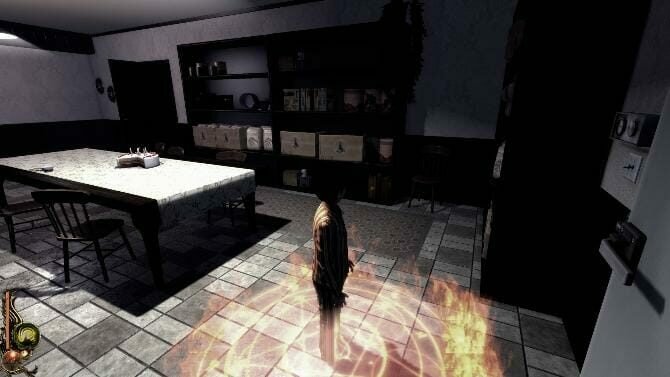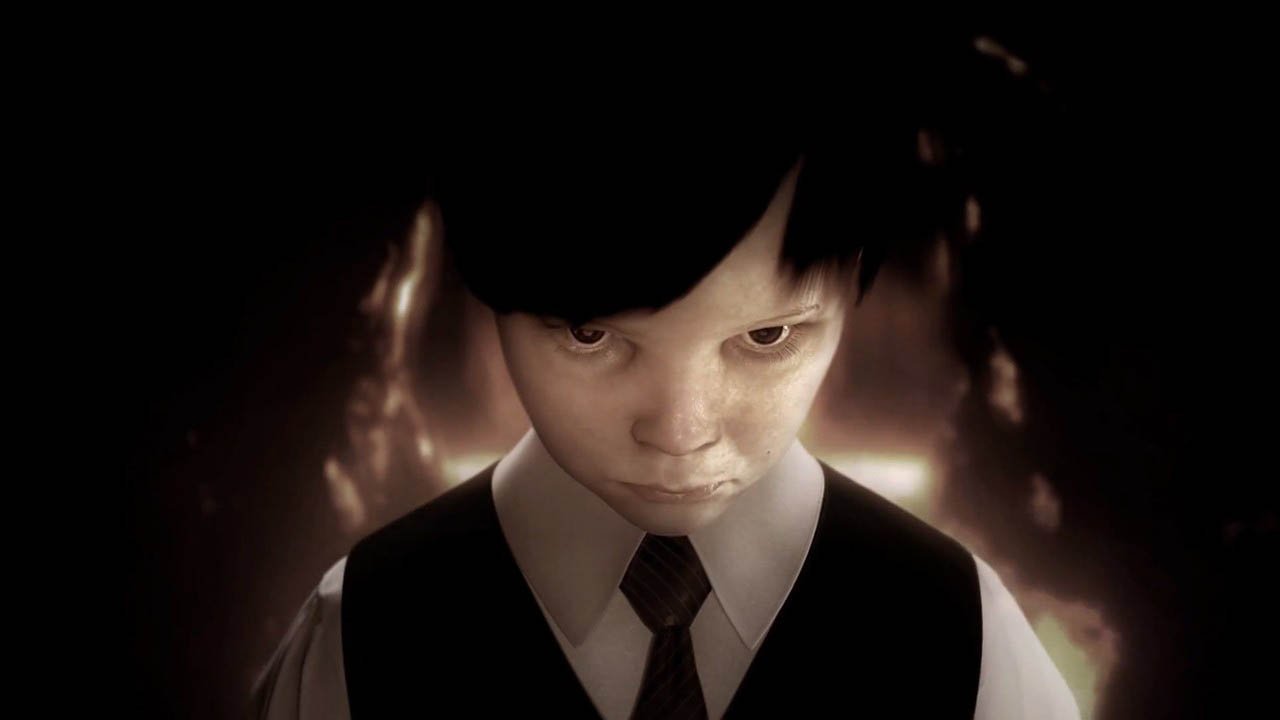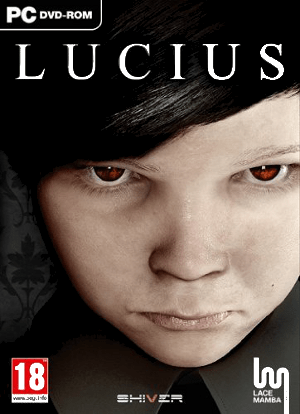If movies have taught me anything it’s that children can’t be trusted. One minute they’re providing naive, heartwarming advice at the climax of a romantic comedy and the next they’re pushing their mothers off of balconies, freaking people out by mysteriously repeating “redrum” or, in the case of Lucius‘ eponymous demon child, systemically murdering everyone they know.
Movies are movies, but games treat children a bit differently, most titles either pretending kids don’t exist or using them as catalysts for adult-centred plots. This isn’t the case for Shiver Games’ Lucius, a horror adventure where players are asked to assume the role of the son of Satan and orchestrate the deaths of his adopted family. Lucius, as the above suggests, wears its cinematic influences on its sleeve to a nearly copyright infringing extent. Its premise — a young, creepily silent boy with questionable lineage uses demonic powers to serve the forces of hell — is lifted directly from The Omen and its sprawling manor house setting is more than a little reminiscent of The Shining‘s infamous hotel.
Aside from the inherent ridiculousness of the writing (the frame story of the game sees Lucius’ crime spree investigated by a, no joke, Detective McGuffin) and the all too familiar story beats, the plot isn’t all that bad. As players pick off the maids, cooks, aunts, uncles and family friends residing in Lucius’ enormous home, Dante Manor, they are propelled forward by a serviceable frame story where McGuffin retrospectively discusses the murders. These segments, badly written and rote as they may be, help to break up the monotony that the game’s highly flawed gameplay creates.

During its opening hours, Lucius entices with what seems to be an open-ended assassination simulator similar to a game like Hitman. The initial handful of chapters introduce the game’s barebones inventory system, provide familiarity with the layout and population of Dante Manor and, most interestingly, unlock telekinetic and telepathic powers with the promise of more skills waiting just a few missions ahead. These mechanics are taught through turnkey puzzles that are initially compelling due to their novelty (the game opens with Lucius trapping a maid in a walk-in freezer, padlocking the door and lowering the temperature), but quickly reveal themselves as bog standard, numbingly linear exercises in logic jumping or, worse, pixel hunting.
Dante Manor is full of hidden rooms, seemingly useful items and environments that seem tailored toward experimental gameplay. When it becomes apparent that every one of Lucius’ murders can only be accomplished through an extremely specific sequence of actions (these steps recall the brain melting boredom of old, poorly considered adventure titles) it immediately becomes clear just how much of a wasted opportunity the game actually is. By the time the puzzle/killings have artificially increased their difficulty by featuring more and more obscure solutions, most players will have lost patience entirely.
A series of toys unlocked through completing chores (like fetching tools for workers, taking out the garbage or cleaning up the wooden cars littering Lucius’ bedroom) are meant to help offset the arbitrary challenge of the later game. The first toy, a Ouija board, assists by offering cryptic riddles hinting at what will be used to accomplish the next murder despite the fact that figuring out the right series of steps makes for all the difficulty in killing a character, not discovering the tools to be used. The music box given to Lucius by the devil is meant to provide a limited-use hint system (the tool highlights important items or places in a given room and stops functioning after six uses), but fails to be of much help because it fails to target environmental features that are important in a given objective, instead directing the players attention to any item or spot that may be useful at some point in the game, present or future. Trying to solve a puzzle in one chapter only to be given hints that take the player on a wild goose chase toward finding items for an objective hours ahead serves the rather opposite purpose of further confusing rather than helping with the task at hand.
This kind of slapdash design ethos plagues the entire game and forces the question of whether Lucius was playtested at all (and, if it was, why Shiver Games didn’t address the kind of things that are sure to become common complaints). The lack of a manual save/load function seems like a gross oversight that could have been fixed with little trouble. With puzzles as obscure as the ones on offer here, Lucius is a game that begs to be suspended and returned to later. That such a minor feature was overlooked is really unfortunate because, as small an issue as it may seem, being unable to close the game and return to it another time makes playing through certain chapters far more frustrating than they ought to be.
Worse are the times when the player is forced to restart clumsy stealth sequences or re-load entire levels (frequently negating half an hour to forty five minutes of progress) due to accidentally clicking the wrong button or missing context-sensitive prompts when timing is at stake. With a barely present checkpoint system serving as the only backup it’s inexcusable to forego a feature as vital as manual save states.
This carelessness continues through to glitchy scripting (during a mission near the end of the game that sees Lucius devising a way to commit a double murder in Dante Manor’s garage a character’s AI pattern made a puzzle unsolvable until, after five or six reloads, I lucked into the exact set of conditions that made this problem disappear just long enough to progress) to make for far too many banging-head-on-desk moments of complete and utter frustration. Combined with the game’s stilted animation, corny voice acting, awful dialogue and bizarre-looking character models, it seems that Lucius may have been rushed out the door before it was ready for retail.
All of this is a shame because, as much as the text above has centred on the glaring problems that make up the bulk of playing the game, Lucius is one year of developer reiteration and bug-squashing away from being something really special. The concept of letting players control a Damien Thorn-esque antichrist in an open world horror story is compelling and unique. That Shiver Games nailed so much of the basic design concept, but failed to execute on their own premise is really too bad. If adding greater variety to the killing methods (never thought I’d say that) on offer wasn’t realistic for the team it would at least have been good to ensure that Lucius‘ humble scope was presented as smoothly as possible.
As it is, Lucius is a fascinating concept for an adventure game that fails because it ends up feeling like nothing more than just that: a fascinating concept. While Shiver Games may have a great title ahead of them, the collection of missed opportunities, frustrating mechanics and broken gameplay that has been offered up here isn’t worth the attention of any but the most curious (and masochistic) players.





